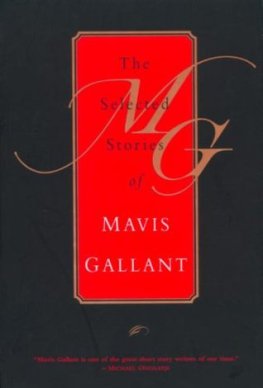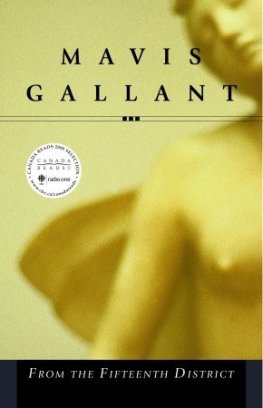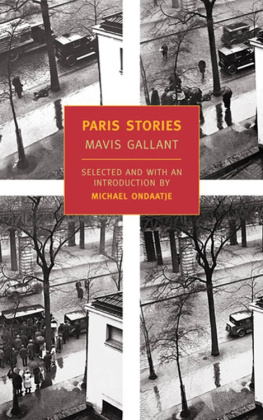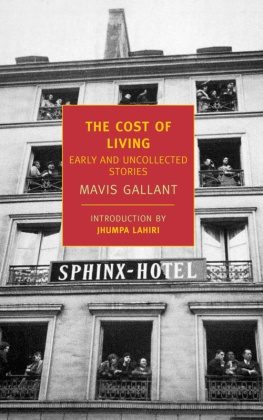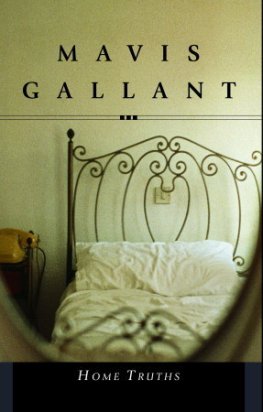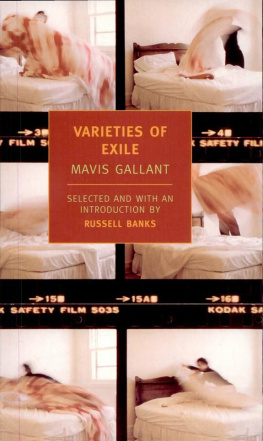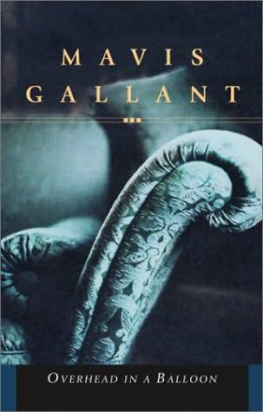Mavis Gallant
The Moslem Wife and Other Stories
The year printed at the end of each story indicates its original date of publication. In this collection I have reprinted the text of each story as it appeared in the authors most recent published version: About Geneva (The Other Paris 1956); When We Were Nearly Young (In Transit 1988); My Heart Is Broken and The Ice Wagon Going Down the Street (My Heart Is Broken 1964); An Autobiography (The Pegnitz Junction 1973); Saturday and In Youth Is Pleasure (Home Truths 1981); The Latehomecomer and The Moslem Wife (From the Fifteenth District 1979); Grippes and Poche and Overhead in a Balloon (Overhead in a Balloon 1985).
D.S.
GRANNY was waiting at the door of the apartment. She looked small, lonely, and patient, and at the sight of her the children and their mother felt instantly guilty. Instead of driving straight home from the airport, they had stopped outside Nice for ice cream. They might have known how much those extra twenty minutes would mean to Granny. Colin, too young to know what he felt, or why, began instinctively to misbehave, dragging his feet, scratching the waxed parquet. Ursula bit her nails, taking refuge in a dream, while the childrens mother, Grannys only daughter, felt compelled to cry in a high, cheery voice, Well, Granny, here they are, safe and sound!
Darlings, said Granny, very low. Home again. She stretched out her arms to Ursula, but then, seeing the taxi driver, who had carried the childrens bags up the stairs, she drew back. After he had gone she repeated the gesture, turning this time to Colin, as if Ursulas cue had been irrevocably missed. Colin was wearing a beret. Wherever did that come from? Granny said. She pulled it off and stood still, stricken. My darling little boy, she said, at last. What have they done to you? They have cut your hair. Your lovely golden hair. I cannot believe it. I dont want to believe it.
It was high time, the childrens mother said. She stood in the outer corridor, waiting for Grannys welcome to subside. It was high time someone cut Colins hair. The curls made such a baby of him. We should have seen that. Two women cant really bring up a boy.
Granny didnt look at all as if she agreed. Who cut your hair? she said, holding Colin.
Barber, he said, struggling away.
Less said the better, said Colins mother. She came in at last, drew off her gloves, looked around, as if she, and not the children, had been away.
Hes not my child, of course, said Granny, releasing Colin. If he were, I can just imagine the letter I should write. Of all the impudence! When you send a child off for a visit you expect at the very least to have him returned exactly as he left. And you, she said, extending to Ursula a plump, liver-spotted hand, what changes am I to expect in you?
Oh, Granny, for Heavens sake, it was only two weeks. She permitted her grandmother to kiss her, then went straight to the sitting room and hurled herself into a chair. The room was hung with dark engravings of cathedrals. There were flowers, red carnations, on the rickety painted tables, poked into stiff arrangements by a maid. It was the standard seasonal Nice meubl. Granny spent every winter in rented flats more or less like this one, and her daughter, since her divorce, shared them with her.
Granny followed Ursula into the room and sat down, erect, on an uncomfortable chair, while her daughter, trailing behind, finally chose a footstool near the empty fireplace. She gave Granny a gentle, neutral look. Before starting out for the airport, earlier, she had repeated her warning: There were to be no direct questions, no remarks. It was all to appear as natural and normal as possible. What, indeed, could be more natural for the children than a visit with their father?
What, indeed, said Granny in a voice rich with meaning.
It was only fair, said the childrens mother. A belief in fair play was so embedded in her nature that she could say the words without coloring deeply. Besides, it was the first time he had asked.
And wont be the last, Granny said. But, of course, it is up to you.
Ursula lay rather than sat in her chair. Her face was narrow and freckled: She resembled her mother who, at thirty-four, had settled into a permanent, anxious-looking, semi-youthfulness. Colin, blond and fat, rolled on the floor. He pulled his mouth out at the corners, then pulled down his eyes to show the hideous red underlids. He looked at his grandmother and growled like a lion.
Colin has come back sillier than ever, Granny said. He lay prone, noisily snuffing the carpet. The others ignored him.
Did you go boating, Ursula? said Granny, not counting this as a direct question. When I visited Geneva, as a girl, we went boating on the lake. She went on about white water birds, a parasol, a boat heaped with colored cushions.
Oh, Granny, no, said Ursula. There werent even any big boats, let alone little ones. It was cold.
I hope the house, at least, was warm.
But evidently Ursula had failed to notice the temperature of her fathers house. She slumped on her spine (a habit Granny had just nicely caused her to get over before the departure for Geneva) and then said, unexpectedly, Shes not a good manager.
Granny and her daughter exchanged a look, eyebrows up.
Oh? said Ursulas mother, pink. She forgot about the direct questions and said, Why?
Its not terribly polite to speak that way of ones hostess, said Granny, unable to resist the reproof but threatening Ursulas revelation at the source. Her daughter looked at her, murderous.
Well, said Ursula, slowly, once the laundry didnt come back. It was her fault, he said. Our sheets had to be changed, he said. So she said Oh, all right. She took the sheets off Colins bed and put them on my bed, and took the sheets off my bed and put them on Colins. To make the change, she said.
Dear God, said Granny.
Colins sheets were a mess. He had his supper in bed sometimes. They were just a mess.
Not true, said Colin.
Another time , said Ursula, and stopped, as if Granny had been right, after all, about criticizing ones hostess.
Gave us chocolate, came from Colin, his face muffled in carpet.
Not every day, I trust, Granny said.
For the plane.
It might very well have made you both airsick, said Granny.
Well, said Ursula, it didnt. Her eyes went often to the luggage in the hall. She squirmed upright, stood up, and sat down again. She rubbed her nose with the back of her hand.
Ursula, do you want a handkerchief? said Granny.
No, said Ursula. Only it so happens Im writing a play. Its in the suitcase.
Granny and the childrens mother looked at each other again. I am pleased, Granny said, and her daughter nodded, agreeing, for, if impertinence and slumping on ones spine were unfortunate inherited tendencies, this was something else. It was only fair that Ursulas father should have bequeathed her something to compensate for the rest. What is it about? said Granny.
Ursula looked at her feet. After a short silence she said, Russia. Thats all I want to tell. It was her idea. She lived there once.
Quietly, controlled, the childrens mother took a cigarette from the box on the table. Granny looked brave.
Would you tell us the title, at least? said Granny.
No, said Ursula. But then, as if the desire to share the splendid thing she had created were too strong, she said, Ill tell you one line, because they said it was the best thing theyd ever heard anywhere. She took a breath. Her audience was gratifyingly attentive, straining, nearly, with attention and control. It goes like this, Ursula said. The Grand Duke enters and sees Tatiana all in gold.


